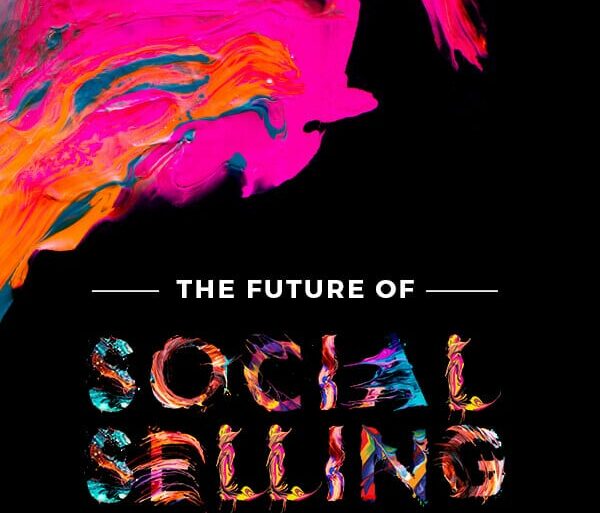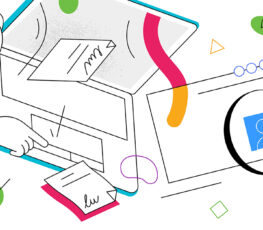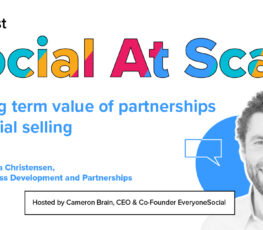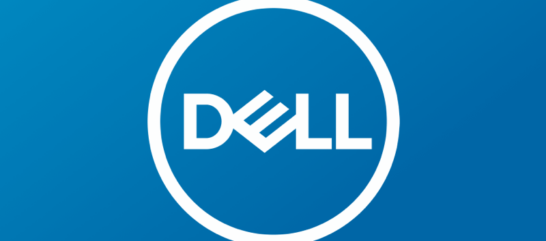Future of Social Selling: What’s Next?
It may seem silly to talk about the future of social selling – something that itself is quite new–however, the pace of innovation is logarithmic, not linear.
Companies and sales teams have opened their eyes to the fact that social is the new frontier of selling.
Everyone you want to reach is online and generally open to engaging.
Many of those companies and teams are putting effective social selling strategies in place today (see Genesys and how they’ve used social selling to increase pipeline, win rate, and deal size).
However, social selling is still very much in its infancy.
Many of the tools and services and tactics that will unlock its full potential have yet to hit the market. But trust us, they are coming, and quickly.
Being that we work with many organizations already engaged in social selling, I want to give you a sense of the future of social selling; what’s coming down the pike and how it’s going to affect your business.
Let’s jump in.
About enabling the individual:
Make no mistake, social selling starts and ends with the individual and that goes for the salesperson and the buyer.
However, and speaking specifically about the salesperson, social selling has from day one been about making them more effective sellers by providing tools and tactics to better connect and engage with prospective buyers.
Yes, as we look forward, data, AI and automation will have increasing parts to play, but the best solutions will be focused on employing those abilities to further augment the salesperson.
Especially in the world of B2B tech, the future (at least the next 10-20 years) won’t mark the extinction of the salesperson, it will see the augmentation of the salesperson.
Your company will own the data:
Social selling today, like the name implies revolves around social networks.
That’s where the buyers are, and so as a salesperson, that’s where you need to connect and engage with.
However, we don’t think that’s always going to be the case.
Consider this for a second: your company (assuming you work at a moderately sized company) has more detailed, up-to-date, valuable data on everyone you want to connect with (prospects, potential hires, partners, etc.) than any social network.
The issue today is that most of that data is inaccessible across myriad siloed systems.
But that is changing, and in a few years time many companies, perhaps the majority will be unleashing their data on their teams in a manner that will make social networks and the data they offer look like mere playthings.
Looking to get started with social selling at your company? Download the Getting Started Guide to Social Selling.
True, closed-loop tracking:
From day one our clients have asked us the question “Can you tell me who clicked on my content?”
That is, in many respects the holy grail of social selling: when you can understand who clicked, read, engaged, reshared, bookmarked, etc., something you did, then you can understand how much of an impact that action and result have on your sales efforts.
Why can’t this be done today?
Well, mostly because the social networks aren’t willing to share that level of information.
However back in 2016, Linkedin did and helped Genesys understand exactly how the social selling actions of their sales team affected pipeline, win rate, and deal size.
Fortunately for the rest of us, the future of social selling will include tracking that answers the question who clicked on my content without requiring a social network to give it to you (see drawing blood from a stone).
AI-driven recommendations:
Yes, the hype is real: AI is coming to sales!
But, like most things, the majority of people who are talking about AI and its applications to sales don’t have much to offer in the way of specifics.
While we don’t purport to be able to tell the future, from what we are seeing it appears that AI is going to have a significant impact on automation and personalization.
Going back to enabling the individual, what if a system could not only tell you when, what, and how to engage with a prospect, but what prospects you should be engaging with?
Unlike many of the assertions made above, tools that can do this are already in the market: from Node.io to Madkudu, AI is going to take a lot of the guesswork out of outreach, nurturing, and engagement, leaving the salesperson with more time to think strategically.
Final Thoughts:
One of the really exciting things about the future of social selling and the ideas I’ve outlined is that we’re well on their way to being a reality.
If you’re familiar with the account-based marketing trend, we’re on much the same path with social selling and the future of sales in general: it all centers on scalability, efficiency, automation, and personalization.
In closing, I would caution anyone who thinks that they can sit on the sidelines until the future of social selling is upon us. As with most market opportunities, the winners are going to be the ones who were already on the field when the rules change.
Has your company started implementing social selling yet? See how social selling and employee advocacy software can help turn your team into powerful marketers, sellers, and recruiters.
















